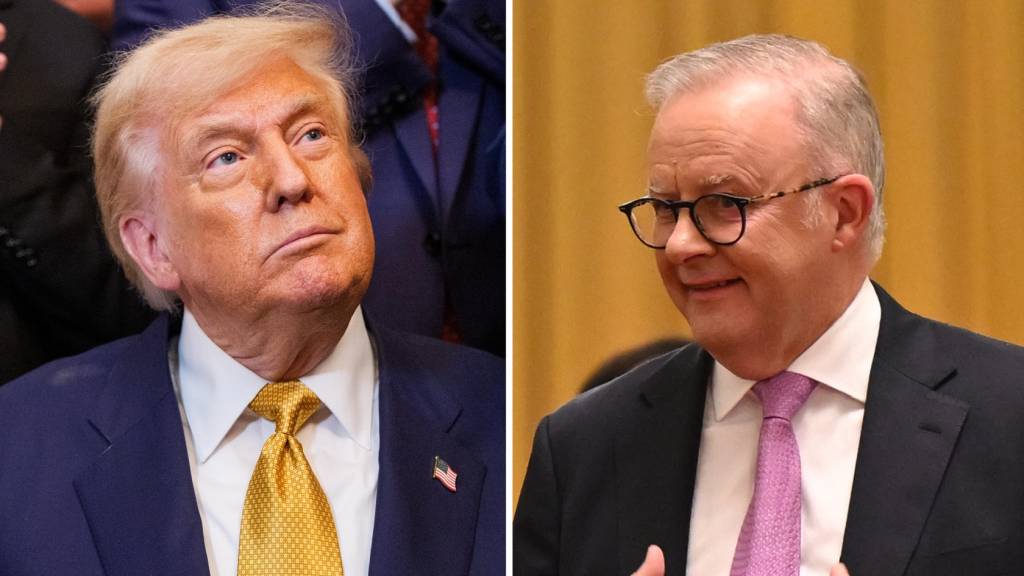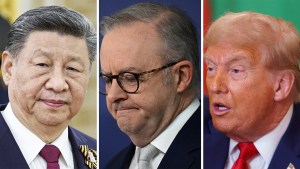How to account for the rather stark shift in media coverage of Anthony Albanese’s trip to China this week?
The prime minister last visited China in November 2023, meeting President Xi Jinping and Premier Li Qiang, as part of the recovery of relations from their nadir during the Morrison era. Media coverage was hardheaded and realistic: temperatures were “thawing” but there was a long way to go, according to the Financial Review; trade was booming as China moved to end its tariffs on some Australian products, The Australian reported. It was a risky trip but Australia was coming from a position of strength, The Australian wrote elsewhere. And while Nine’s resident Sinophobe, Peter Hartcher, sneered at the monstrous tyranny, its journalists reported deals that ended years of tensions, Xi’s flattery of Albanese, and lauded Albanese’s willingness to keep up the diplomatic work.
The tenor has changed remarkably for this week’s trip. While the shift may be as much among subeditors as journalists and op-ed writers, the stories are quite different. Albanese had no sooner arrived in China than, according to the Financial Review, his entire trip was “thrown off course” after the Financial Times revealed that the Trump administration was demanding to know what Australia would do in the event of a war with China (the only people thrown off course were the Coalition, when Angus Taylor pre-committed Australia to defend Taiwan). The visit, other outlets agreed, had certainly been “overshadowed” by AUKUS (the unfortunates at the Daily Mail tried for “derailed” instead).
Related Article Block Placeholder
Article ID: 1214501
Reliable arch-hawk Michael Shoebridge was pressed into service by the AFR to write that “We’re letting Xi Jinping weaponise our economy all over again“; Brendan Pearson — a fossil fuel advocate so extreme even the Minerals Council gave him the flick — vilified China’s trade practices and lamented that Albanese had failed to “call out” its behaviour (consumers across Australia are just begging to pay higher prices for imported goods, eh Brendan?). News Corp claimed the prime minister had “stumbled” over China’s military build-up; Greg Sheridan joined a parade of Murdoch hirelings and buffoons lining up to excoriate Albanese.
Why the change? Is it because China is more aggressive now? True, it sent some ships on a circumnavigation of Australia earlier this year and conducted a live-fire exercise in international waters with little notice to Australia and New Zealand. But China sent a warship into Australia’s economic zone in 2021; in contrast to the Coalition’s hysteria in February, then prime minister Scott Morrison actually defended the right of the Chinese to be there. Another Chinese vessel appeared off the Western Australian coast during the 2022 election campaign.
Is it because of China’s military build-up? In fact it was the United States that just announced a 13% increase on a military budget already vastly bigger than any other country’s. Is it because China is still imposing tariffs on Australian goods? The last of its Morrison-era tariffs were removed in 2024, while it’s the United States which is now levying tariffs on the world and demanding changes to countries’ domestic policies.
What’s really changed is in Washington — and how Donald Trump has made life increasingly uncomfortable for the adherents in Australia of an ever-closer alliance with the United States. And that describes the bulk of our defence and security establishment, which is in turn relied on by our commercial media as their key source for guidance on geopolitical issues. Not that this isn’t coloured by other issues, of course: News Corp’s relentlessly pro-US line reflects the fact that it is a US company and its local outlets are activists for US interests, while its deep hatred of Malcolm Turnbull means it reflexively attacks any commentary from the former prime minister on an issue like AUKUS, even when News Corp’s own foreign policy editors know that the military pact is a debacle.
But it is our pro-American defence establishment that dictates what constitutes bien pensant thinking around Australia’s strategic policies in the media. Unfortunately for them, Trump is busy wrecking the entire image of the United States carefully crafted over generations by its advocates here: that of a benign force for democracy, stability, free markets and shared values.
Instead, Trump seems hell-bent on confirming every left-wing stereotype of the United States since the start of the Cold War — that America is a malignant, imperialistic power that happily tramples over the rights of other countries abroad and its own people at home and represents a force for instability, not security.
The deep fear the Mad King has thus engendered in our American apologists is that, in unmasking what America is really like, and how little it differs from a long-demonised country like China, Trump will push the Australian electorate to reject the relentless integration of Australia into the US military and intelligence machine that has been bipartisan policy since the Gillard years, in favour of a more independent foreign policy.
Related Article Block Placeholder
Article ID: 1213714
In that context, they’re torn over China’s rise to economic dominance: they understand how important the Chinese economy is to Australian prosperity, but ache for ways to constrain it and protect American economic and technological primacy.
From their perspective, and that of the editors and journalists they ceaselessly brief and for whom they contribute op-eds, China is a bigger threat than ever because the United States is now so unappealing, and a functional relationship with Beijing is all the greater a threat given Trump has made relationships with Washington contingent on bowing to his agenda in a way far less subtle than anything that has emanated from China.
It’s muddled thinking from a section of the governing class that, for 80 years, hasn’t had to do much thinking at all, because the answer to every problem was to defer to the United States. They have let the means — an alliance with the United States — replace the ends — Australia’s security, prosperity and sovereignty.
Does Australia need to rethink its relationship with the US?
We want to hear from you. Write to us at letters@crikey.com.au to be published in Crikey. Please include your full name. We reserve the right to edit for length and clarity.



